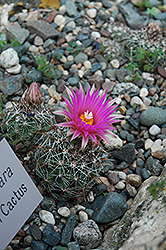It's all about ...
plants

Height: 6 inches
Spread: 3 inches
Sunlight:
![]()
Hardiness Zone: 4a
Other Names: Ball, Beehive Cactus, syn. Escobaria vivipara
Description:
Small in stature, this variety features round or oblong shaped growth with white spines arranged in star-shaped patterns; presents beautiful fuchsia colored blooms in mid spring; prefers dry, sandy conditions; easy to grow and low maintenance
Ornamental Features
Pincushion Cactus is a member of the cactus family, which are grown primarily for their characteristic shapes, their interesting features and textures, and their high tolerance for hot, dry growing environments. Like all cacti, it doesn't actually have leaves, but rather modified succulent stems that comprise the bulk of the plant, and which are designed to hold water for long periods of time. This particular cactus is valued for its globe-shaped form consisting of a cluster of spiny polygonal dark green stem segments held tightly together. This plant has fuchsia trumpet-shaped flowers with yellow throats and white anthers held atop the stems from mid spring to mid summer, which are interesting on close inspection. It produces forest green berries from late summer to mid fall.
Landscape Attributes
Pincushion Cactus is a tiny succulent evergreen plant with a definitively globe-shaped form. As a type of cactus, it has no true foliage; the body of the plant is wholly comprised of a tight cluster of spiny dark green stems which are distinctly geometric in form.
This is a relatively low maintenance plant, and should never be pruned except to remove any dieback, as it tends not to take pruning well. It has no significant negative characteristics.
Pincushion Cactus is recommended for the following landscape applications;
- Rock/Alpine Gardens
- General Garden Use
- Container Planting
Planting & Growing
Pincushion Cactus will grow to be only 6 inches tall at maturity, with a spread of 3 inches. It is often either grown as a solitary specimen or permitted to grow into a broader colony as part of a garden composition. It grows at a slow rate, and under ideal conditions can be expected to live for approximately 10 years.
This plant should only be grown in full sunlight. It requires an extremely dry, well-drained growing location, and will usually die in standing water. It is considered to be drought-tolerant, and thus makes an ideal choice for a low-water garden or xeriscape application. Like most succulents and cacti, this plant prefers to grow in poor soils and should therefore never be fertilized. It is not particular as to soil pH, but grows best in sandy soils. It is somewhat tolerant of urban pollution. Consider covering it with a thick layer of mulch in winter to protect it in exposed locations or colder microclimates. This species is native to parts of North America.
Pincushion Cactus is a fine choice for the garden, but it is also a good selection for planting in outdoor pots and containers. It is often used as a 'filler' in the 'spiller-thriller-filler' container combination, providing a mass of flowers and foliage against which the thriller plants stand out. Note that when growing plants in outdoor containers and baskets, they may require more frequent waterings than they would in the yard or garden. Be aware that in our climate, most plants cannot be expected to survive the winter if left in containers outdoors, and this plant is no exception. Contact our experts for more information on how to protect it over the winter months.
This plant is not reliably hardy in our region, and certain restrictions may apply; contact the store for more information.
